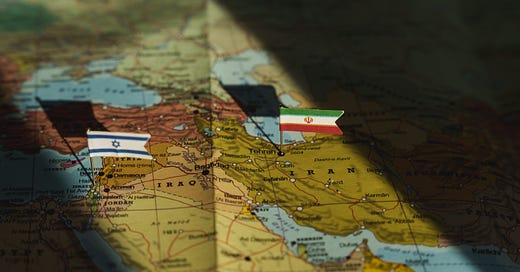What's At Play: Israel's Attack on Iran
Netanyahu's latest gambit will likely reshape the map of the Middle East, yet again. What it means in the longer term is unclear.
Yesterday’s post, written just before Israel launched its ongoing attack on Iran, argued that the Israel-Gaza conflict (which really should be called the Israel-Iran-Hamas war) was leading Israel and the Palestinians to lose the existential plot, as other countries, including the US, Egypt and Gulf States, gradually give up on the prospects of economic and security integration, leaving both Israelis and Palestinians to contend with the great levelers of climate change and water scarcity (among other issues) alone.*
Israel’s attack on Iran is likely to be just as pivotal an event as the 10/7 Hamas attack on Israel, a de facto proxy attack by Iran on Israel, and the decapitation of Israel’s main regional proxy Hezbollah in Lebanon (I discuss this at length in earlier posts).
Current Atmospherics:
While we’re less than 24 hours into a sweeping, multi-site Israeli operation across a large area of Iranian territory, a few things are getting clearer:
1.) Israel has taken a broad spectrum approach to disrupting Iran’s nuclear capabilities, assassinating key scientists and military leaders (notably the head of the Iran Revolutionary Guard Corps), as well as enrichment facilities. Even if Israel is incapable of ‘fatally’ damaging the core of the nuclear facilities buried deep underground, they’re heavily damaging Iran’s supply chain to a nuclear weapon.
2.) Iran’s ability to respond is heavily compromised by previous engagements with Israel, which neutralized much of its regional proxy power, and air defenses. Even if Iran did respond substantively, any major damage in Israel would almost certainly provoke active US involvement, which would likely put a fine end-point on Iran’s nuclear capacity, if not more.
3.) Israel attacked now, because: a.) the US and Iran were entering the 6th round of nuclear talks in Iran this Sunday (a biting irony for Iran, as Iran used the Hamas 10/7 attack to disrupt Saudi-Israel negotiations on a peace /normalization deal with a similarly short fuse). b.) Iran is weaker than it has been in decades and c.) de-fanging Iran’s nuclear program has been clearly Netanyahu’s end game for most of his political career.
4.) An Attempt At Regime Change? What we may be seeing (See my post from January: Are We Seeing The End of the Iranian Regime), is indeed, the last days of the Iranian regime — at least as we know it. And it’s highly likely from the Israel’s choice of targets that it is trying to accelerate regime change.
Impact on the Israel-Gaza War ….and Iran
What that means for the Israel-Palestine conflict — and any post-Revolutionary Iran — is not at all clear. Netanyahu has created a remarkably transformative and toxic legacy: His government’s negligence and corruption facilitated the 10/7 attack; Netanyahu also has overseen the rollback of two of the most actively destructive and oppressive regimes in the region — Iran, and Syria.
Will this translate into greater flexibility on the Palestinian issue, and clemency for Gaza? Don’t count on it. But it does open up a range of other outcomes that have not yet been deeply considered, both positive and much less so (more on that in future posts).
If current events lead to a change in Iranian leadership, will we see a smooth transition? I wouldn’t count on that, either. Iran is not Iraq, but the possibility for widespread disorder following any central collapse should not be underestimated. And unfortunately we are entering into a new age of international atomization — there is no international force or structure ready and capable to provide a superstructure — and a number of hostile players ready to jump in to exploit a power vacuum.
Make no mistake: Israel’s attack on Iran, while it should come as no surprise, is also very big news.
* I’ve been writing a lot about the potential promise of the IMEC — the India-Middle East-Europe Economic Corridor, as one example of a massive regional infrastructure project that promised to create mutual prosperity and interdependencies, while solving fundamental resource shortages. The IMEC’s realism is deeply undercut by regional instability.
The Middle East-Told Slant offers a non-partisan, practitioner's perspective on Middle East politics, conflict, and culture. Written by a former US diplomat, Senior Middle East Analyst, and author of "Benghazi: A New History" (Hachette, 2022) and the forthcoming "Red Sea: A History of the World's Most Volatile Waterway." To receive weekly posts and support this project, consider becoming a free or paid subscriber. I offer paid subscribers a complimentary copy of any of my books in print (equivalent to the cost of the subscription — DM me to redeem).





Kind of a cliffhanger this one